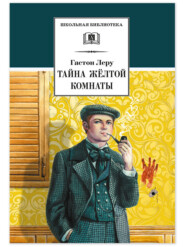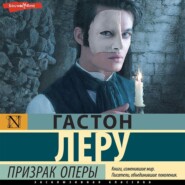По всем вопросам обращайтесь на: info@litportal.ru
(©) 2003-2024.
✖
Призрак оперы / The Phantom of the Opera
Настройки чтения
Размер шрифта
Высота строк
Поля
“Yes, he was found hanging in the third-floor cellar!”
“It’s the ghost!” little Meg blurted; but she at once corrected herself, with her hands pressed to her mouth:
“No, no! I didn’t say it! I didn’t say it!”
All around her repeated:
“Yes—it must be the ghost!”
Sorelli was very pale.
The truth is that no one ever knew how Joseph Buquet met his death. The verdict was “natural suicide.”
The horrid news soon spread all over the Opera, where Joseph Buquet was very popular. The dressing-rooms emptied and the ballet-girls were crowding around Sorelli like timid sheep around their shepherdess.
Chapter II
On the first landing[21 - landing – площадка], Sorelli met the Comte de Chagny, who was coming upstairs. The count, who was generally so calm, seemed greatly excited.
“I was just going to you,” he said, taking off his hat. “Oh, Sorelli, what an evening! And Christine Daae: what a triumph!”
“Impossible!” said Meg. “Six months ago, she used to sing awfully! But, my dear count, we are going to inquire after a poor man who was found hanging by the neck.”
They all went on to the foyer of the ballet[22 - the foyer of the ballet – танцевальное фойе], which was already full of people. The Comte de Chagny was right. The real triumph was reserved for Christine Daae, who had begun by singing a few passages from Romeo and Juliet. No one had ever heard or seen anything like it.
Everybody went mad, shouting, cheering, clapping, while Christine sobbed and fainted in the arms of her fellow-singers and had to be carried to her dressing-room.
The Comte de Chagny was loudly applauding. Philippe de Chagny was just forty-one years old. He was a great aristocrat and a good-looking man, with attractive features, in spite of his hard forehead and his rather cold eyes. He was exquisitely polite to the women and a little haughty to the men, who did not always forgive him for his successes in society. On the death of old Count Philibert[23 - Count Philibert – граф Филибер], he became the head of one of the oldest and most distinguished families in France.
The Chagnys owned a great deal of property; and, when the old count, who was a widower, died, it was no easy task for Philippe to accept the management of so large an estate. His two sisters and his brother, Raoul[24 - Raoul – Рауль], would not hear of a division, leaving themselves entirely in Philippe’s hands. When the two sisters married, on the same day, they received their portion from their brother—as a dowry for which they thanked him.
The Comtesse de Chagny, had died in giving birth to Raoul, who was born twenty years after his elder brother. At the time of the old count’s death, Raoul was twelve years of age. Philippe gave young Raoul a taste for the sea. The lad finished his course with honors and made his trip round the world. He had just been appointed a member of the official expedition, which was to be sent to the Arctic Circle. Meanwhile, he was enjoying a long furlough.
The shyness of the lad—I was almost saying his innocence—was remarkable. He was petted by his two sisters and his old aunt. He was a little over twenty-one years of age and looked eighteen. He had a small, fair mustache, beautiful blue eyes and a complexion like a girl’s.
Philippe was very proud of Raoul and pleased to foresee a glorious career for his junior in the navy in which one of their ancestors had held the rank of admiral. Philippe wanted to show him Paris, with all its luxurious and artistic delights. Philippe himself had a character that was very well-balanced in work and pleasure alike; and he was incapable of setting his brother a bad example. He took him with him wherever he went. He even introduced him to the foyer of the ballet.
On that evening, Philippe, after applauding the Daae, turned to Raoul and saw that he was quite pale.
“Don’t you see,” said Raoul, “that the woman’s fainting?”
“You look like fainting yourself,” said the count. “What’s the matter?”
But Raoul had recovered himself and was standing up.
“Let’s go and see,” he said, “she never sang like that before.”
The count gave his brother a curious smiling glance and seemed quite pleased. They were soon at the door leading to the stage. Raoul tore his gloves without knowing what he was doing.
They reached the stage. Raoul was leading the way, feeling that his heart no longer belonged to him. Count Philippe followed him with difficulty and smiled. The count was surprised to find that Raoul knew the way. He had never taken him to Christine’s himself and came to the conclusion that Raoul must have gone there alone while the count stayed talking in the foyer with Sorelli.
Postponing his usual visit to Sorelli for a few minutes, the count followed his brother down the passage that led to Daae’s dressing-room and saw that it had never been so crammed as on that evening, when the whole house seemed excited by her success. The doctor of the theater had just arrived at the moment when Raoul entered. Christine opened her eyes. The count and many more remained crowding in the doorway.
“Don’t you think, Doctor, that those gentlemen had better clear the room?” asked Raoul coolly. “There’s no breathing here.”
“You’re quite right,” said the doctor.
And he sent every one away, except Raoul and the maid, who looked at Raoul with eyes of the most undisguised astonishment. She had never seen him before and yet dared not question him; and the doctor imagined that the young man was only acting as he did because he had the right to. The viscount, therefore, remained in the room watching Christine as she slowly returned to life, while even the joint managers, Debienne and Poligny, who had come to offer their sympathy and congratulations, found themselves thrust into the passage among the crowd of dandies. The Comte de Chagny laughed.
He turned to go to Sorelli’s dressing-room, but met her on the way, with her little troop of trembling ballet-girls, as we have seen.
Meanwhile, Christine Daae uttered a deep sigh, which was answered by a groan. She turned her head, saw Raoul and started. She looked at the doctor, on whom she bestowed a smile, then at her maid, then at Raoul again.
“Monsieur,” she said, “who are you?”
“Mademoiselle,” replied the young man, kneeling on one knee and pressing a fervent kiss on the diva’s hand, “I am the little boy who went into the sea to rescue your scarf.”
Christine again looked at the doctor and the maid; and all three began to laugh.
Raoul turned very red and stood up.
“Mademoiselle,” he said, “since you are pleased not to recognize me, I should like to say something to you in private, something very important.”
“When I am better, do you mind?” And her voice shook.
“Yes, you must go,” said the doctor, with his pleasantest smile. “Leave me to attend to mademoiselle.”
“I am not ill now,” said Christine suddenly, with strange and unexpected energy.
She rose and passed her hand over her eyelids.
“Thank you, Doctor. I should like to be alone. Please go away, all of you. Leave me. I feel very restless this evening.”
The doctor tried to make a short protest, but he thought the best remedy was not to thwart her.
And he went away, saying to Raoul, outside:
“She is not herself tonight. She is usually so gentle.”
Then he said good night and Raoul was left alone. This part of the theater was now deserted. Raoul felt a terrible pain at his heart and he wanted to speak to Daae without delay.
Suddenly the dressing-room door opened and the maid came out, carrying bundles. He stopped her and asked how her mistress was. The woman laughed and said that she was quite well, but that he must not disturb her, for she wished to be left alone. And she passed on. One idea filled Raoul’s burning brain: of course, Daae wished to be left alone for him! Had he not told her that he wanted to speak to her privately?
Hardly breathing, he went up to the dressing-room and, with his ear to the door to catch her reply, prepared to knock. But his hand dropped. He had heard a man’s voice in the dressing-room:
“Christine, you must love me!”
And Christine’s voice, infinitely sad and trembling, as though accompanied by tears, replied:
“It’s the ghost!” little Meg blurted; but she at once corrected herself, with her hands pressed to her mouth:
“No, no! I didn’t say it! I didn’t say it!”
All around her repeated:
“Yes—it must be the ghost!”
Sorelli was very pale.
The truth is that no one ever knew how Joseph Buquet met his death. The verdict was “natural suicide.”
The horrid news soon spread all over the Opera, where Joseph Buquet was very popular. The dressing-rooms emptied and the ballet-girls were crowding around Sorelli like timid sheep around their shepherdess.
Chapter II
On the first landing[21 - landing – площадка], Sorelli met the Comte de Chagny, who was coming upstairs. The count, who was generally so calm, seemed greatly excited.
“I was just going to you,” he said, taking off his hat. “Oh, Sorelli, what an evening! And Christine Daae: what a triumph!”
“Impossible!” said Meg. “Six months ago, she used to sing awfully! But, my dear count, we are going to inquire after a poor man who was found hanging by the neck.”
They all went on to the foyer of the ballet[22 - the foyer of the ballet – танцевальное фойе], which was already full of people. The Comte de Chagny was right. The real triumph was reserved for Christine Daae, who had begun by singing a few passages from Romeo and Juliet. No one had ever heard or seen anything like it.
Everybody went mad, shouting, cheering, clapping, while Christine sobbed and fainted in the arms of her fellow-singers and had to be carried to her dressing-room.
The Comte de Chagny was loudly applauding. Philippe de Chagny was just forty-one years old. He was a great aristocrat and a good-looking man, with attractive features, in spite of his hard forehead and his rather cold eyes. He was exquisitely polite to the women and a little haughty to the men, who did not always forgive him for his successes in society. On the death of old Count Philibert[23 - Count Philibert – граф Филибер], he became the head of one of the oldest and most distinguished families in France.
The Chagnys owned a great deal of property; and, when the old count, who was a widower, died, it was no easy task for Philippe to accept the management of so large an estate. His two sisters and his brother, Raoul[24 - Raoul – Рауль], would not hear of a division, leaving themselves entirely in Philippe’s hands. When the two sisters married, on the same day, they received their portion from their brother—as a dowry for which they thanked him.
The Comtesse de Chagny, had died in giving birth to Raoul, who was born twenty years after his elder brother. At the time of the old count’s death, Raoul was twelve years of age. Philippe gave young Raoul a taste for the sea. The lad finished his course with honors and made his trip round the world. He had just been appointed a member of the official expedition, which was to be sent to the Arctic Circle. Meanwhile, he was enjoying a long furlough.
The shyness of the lad—I was almost saying his innocence—was remarkable. He was petted by his two sisters and his old aunt. He was a little over twenty-one years of age and looked eighteen. He had a small, fair mustache, beautiful blue eyes and a complexion like a girl’s.
Philippe was very proud of Raoul and pleased to foresee a glorious career for his junior in the navy in which one of their ancestors had held the rank of admiral. Philippe wanted to show him Paris, with all its luxurious and artistic delights. Philippe himself had a character that was very well-balanced in work and pleasure alike; and he was incapable of setting his brother a bad example. He took him with him wherever he went. He even introduced him to the foyer of the ballet.
On that evening, Philippe, after applauding the Daae, turned to Raoul and saw that he was quite pale.
“Don’t you see,” said Raoul, “that the woman’s fainting?”
“You look like fainting yourself,” said the count. “What’s the matter?”
But Raoul had recovered himself and was standing up.
“Let’s go and see,” he said, “she never sang like that before.”
The count gave his brother a curious smiling glance and seemed quite pleased. They were soon at the door leading to the stage. Raoul tore his gloves without knowing what he was doing.
They reached the stage. Raoul was leading the way, feeling that his heart no longer belonged to him. Count Philippe followed him with difficulty and smiled. The count was surprised to find that Raoul knew the way. He had never taken him to Christine’s himself and came to the conclusion that Raoul must have gone there alone while the count stayed talking in the foyer with Sorelli.
Postponing his usual visit to Sorelli for a few minutes, the count followed his brother down the passage that led to Daae’s dressing-room and saw that it had never been so crammed as on that evening, when the whole house seemed excited by her success. The doctor of the theater had just arrived at the moment when Raoul entered. Christine opened her eyes. The count and many more remained crowding in the doorway.
“Don’t you think, Doctor, that those gentlemen had better clear the room?” asked Raoul coolly. “There’s no breathing here.”
“You’re quite right,” said the doctor.
And he sent every one away, except Raoul and the maid, who looked at Raoul with eyes of the most undisguised astonishment. She had never seen him before and yet dared not question him; and the doctor imagined that the young man was only acting as he did because he had the right to. The viscount, therefore, remained in the room watching Christine as she slowly returned to life, while even the joint managers, Debienne and Poligny, who had come to offer their sympathy and congratulations, found themselves thrust into the passage among the crowd of dandies. The Comte de Chagny laughed.
He turned to go to Sorelli’s dressing-room, but met her on the way, with her little troop of trembling ballet-girls, as we have seen.
Meanwhile, Christine Daae uttered a deep sigh, which was answered by a groan. She turned her head, saw Raoul and started. She looked at the doctor, on whom she bestowed a smile, then at her maid, then at Raoul again.
“Monsieur,” she said, “who are you?”
“Mademoiselle,” replied the young man, kneeling on one knee and pressing a fervent kiss on the diva’s hand, “I am the little boy who went into the sea to rescue your scarf.”
Christine again looked at the doctor and the maid; and all three began to laugh.
Raoul turned very red and stood up.
“Mademoiselle,” he said, “since you are pleased not to recognize me, I should like to say something to you in private, something very important.”
“When I am better, do you mind?” And her voice shook.
“Yes, you must go,” said the doctor, with his pleasantest smile. “Leave me to attend to mademoiselle.”
“I am not ill now,” said Christine suddenly, with strange and unexpected energy.
She rose and passed her hand over her eyelids.
“Thank you, Doctor. I should like to be alone. Please go away, all of you. Leave me. I feel very restless this evening.”
The doctor tried to make a short protest, but he thought the best remedy was not to thwart her.
And he went away, saying to Raoul, outside:
“She is not herself tonight. She is usually so gentle.”
Then he said good night and Raoul was left alone. This part of the theater was now deserted. Raoul felt a terrible pain at his heart and he wanted to speak to Daae without delay.
Suddenly the dressing-room door opened and the maid came out, carrying bundles. He stopped her and asked how her mistress was. The woman laughed and said that she was quite well, but that he must not disturb her, for she wished to be left alone. And she passed on. One idea filled Raoul’s burning brain: of course, Daae wished to be left alone for him! Had he not told her that he wanted to speak to her privately?
Hardly breathing, he went up to the dressing-room and, with his ear to the door to catch her reply, prepared to knock. But his hand dropped. He had heard a man’s voice in the dressing-room:
“Christine, you must love me!”
And Christine’s voice, infinitely sad and trembling, as though accompanied by tears, replied:

















